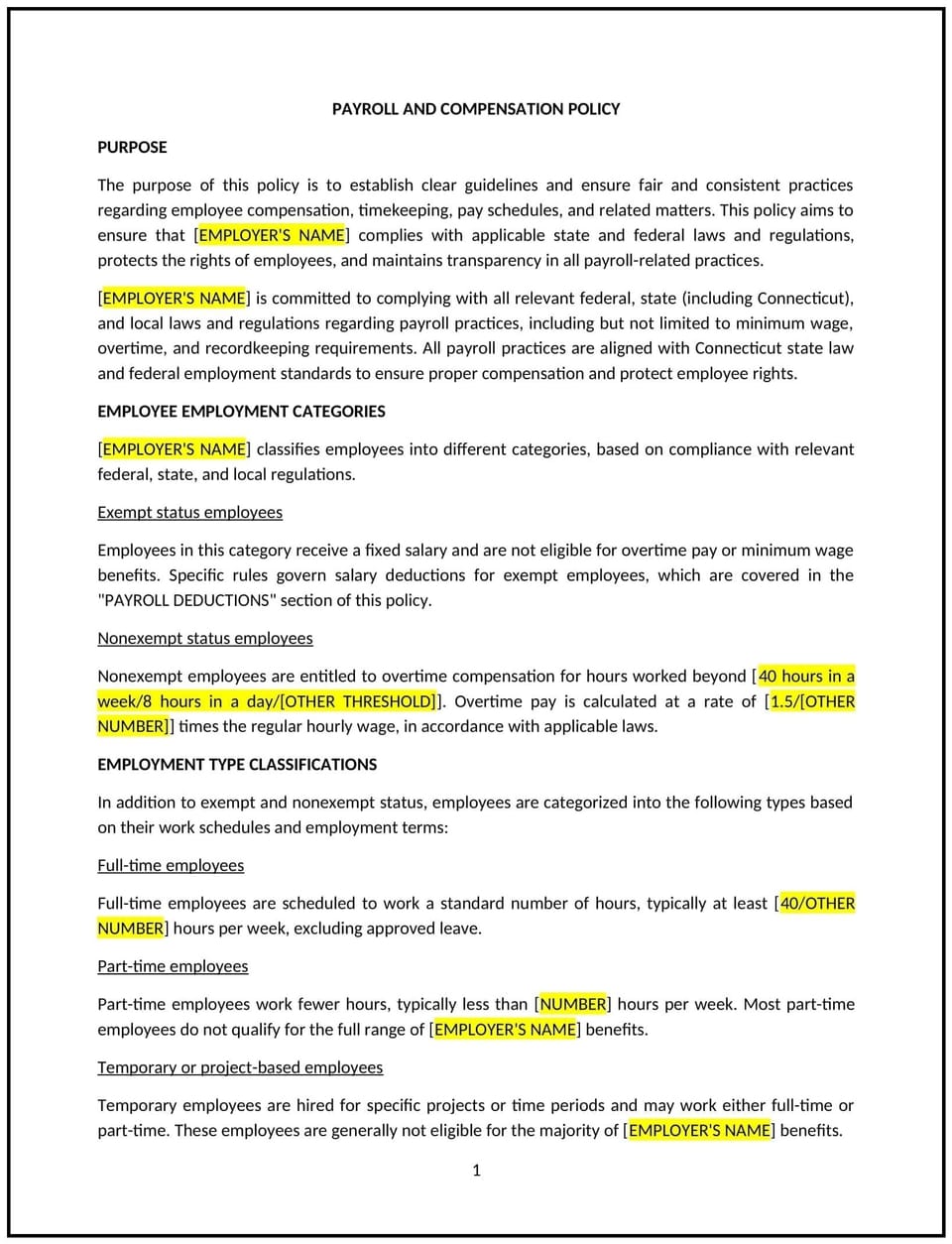Payroll and compensation policy (Connecticut): Free template

Payroll and compensation policy (Connecticut)
A payroll and compensation policy helps Connecticut businesses establish clear guidelines for paying employees, ensuring fairness, consistency, and legal compliance. This policy outlines how salaries, wages, bonuses, and other forms of compensation are determined, as well as the procedures for processing payroll, handling deductions, and addressing employee concerns related to compensation.
By implementing this policy, businesses can create a transparent and compliant compensation structure that promotes employee satisfaction and minimizes legal risks.
How to use this payroll and compensation policy (Connecticut)
- Define compensation structure: Specify the components of compensation, including base salary, hourly wages, bonuses, commissions, and any other forms of compensation offered by the company.
- Set pay schedules: Outline the frequency of pay, such as weekly, bi-weekly, or monthly, and detail how employees will receive their pay (e.g., direct deposit, check).
- Address overtime and bonuses: Provide clear guidelines for calculating overtime pay, as well as any criteria for eligibility for performance bonuses or incentive-based compensation.
- Compliance with laws: Ensure that the policy complies with Connecticut state laws and federal regulations regarding minimum wage, overtime, tax withholdings, and other compensation-related requirements.
- Payroll deductions: Detail the types of deductions that may be made from employees’ pay, including taxes, benefits contributions, retirement plan contributions, and any other required or voluntary deductions.
- Correcting payroll errors: Establish a procedure for addressing payroll discrepancies, including how employees can report issues and how the company will correct mistakes in a timely manner.
Benefits of using this payroll and compensation policy (Connecticut)
This policy offers several benefits for Connecticut businesses:
- Promotes fairness and consistency: Provides clear guidelines for how employees are compensated, ensuring that pay decisions are consistent and equitable across the company.
- Ensures legal compliance: Helps the business comply with Connecticut and federal wage and hour laws, reducing the risk of legal challenges or fines.
- Enhances transparency: By outlining pay schedules, compensation components, and deductions, the policy ensures that employees fully understand how their pay is calculated and any deductions made.
- Increases employee satisfaction: A clear and fair compensation structure fosters trust and job satisfaction, which can improve employee morale and retention.
- Reduces payroll errors: The policy establishes procedures for correcting payroll errors quickly, minimizing the impact of mistakes on employees and the business.
Tips for using this payroll and compensation policy (Connecticut)
- Communicate the policy clearly: Ensure that all employees understand the company’s compensation structure, pay schedule, and payroll deductions, and have access to the policy as needed.
- Monitor compliance regularly: Conduct regular audits of payroll processes to ensure that the company is in compliance with Connecticut state laws and federal wage regulations.
- Keep accurate records: Maintain accurate records of employee compensation, overtime hours worked, and payroll deductions to comply with recordkeeping requirements and facilitate any necessary audits.
- Address payroll issues promptly: Establish a system for employees to report payroll errors and ensure that corrections are made in a timely and transparent manner.
- Review periodically: Update the policy regularly to reflect changes in Connecticut laws, federal regulations, or business practices, ensuring that it remains compliant and effective.
Q: How does this policy benefit my business?
A: The policy ensures that employees are paid fairly and consistently, helps the business comply with state and federal wage laws, and fosters transparency and trust regarding compensation, which leads to improved employee satisfaction and retention.
Q: What is the pay schedule for employees?
A: The pay schedule can vary, but the policy should outline whether employees are paid weekly, bi-weekly, or monthly, and how pay is delivered (e.g., direct deposit or paper check).
Q: How are overtime pay and bonuses handled?
A: Overtime pay is calculated based on applicable Connecticut and federal wage laws, typically at a rate of 1.5 times the regular hourly wage. Bonuses and incentive-based compensation are provided based on specific company criteria, and eligibility should be outlined in the policy.
Q: What deductions can be made from an employee’s paycheck?
A: Deductions may include federal and state taxes, Social Security, health insurance premiums, retirement plan contributions, and any other required or voluntary deductions, such as union dues. The policy should specify the types of deductions and when they are applied.
Q: What should I do if an employee has a payroll issue?
A: Employees should report any payroll issues promptly to HR or the payroll department. The company should address and correct any errors quickly, following the process outlined in the policy.
Q: How often should this policy be reviewed?
A: The policy should be reviewed annually or whenever there are updates to Connecticut laws, federal regulations, or changes in company practices to ensure it remains compliant and effective.
This article contains general legal information and does not contain legal advice. Cobrief is not a law firm or a substitute for an attorney or law firm. The law is complex and changes often. For legal advice, please ask a lawyer.


